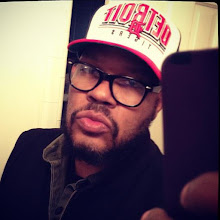
The irony was fleeting, but not lost.
While a majority of the worldwide techno fraternity was heading toward Detroit for the annual three-day electronic music festival now known as Movement, one of the city’s most celebrated and plugged-in acts -- mysterious underground electro legends Dopplereffekt -- was 3,000 miles away. Dopplereffekt was taking the stage at the Roxy to perform to an 18 and older crowd of party people brought together by the marketing mavens of automakers Scion, a youth-targeted brand from Toyota, which is sponsoring the four-city Dopplereffekt U.S. tour.
The band is the conception of one Gerald Donald, who before starting Dopplereffekt was one half of the even more seminal outfit Drexciya. After splitting off to go solo, Dopplereffekt released two vinyl-only albums that are essentials to the Detroit electro canon, 1995’s “Fascist State” and the following year's “Infophysix.” Thick with stark, minimal tracks heavy with irony, songs like “Superior Race” and “Pornoactress” pulse with inner-city energy enraptured with technology and European sensibilities.
But any semblance of a “party” quickly dissipated after Dopplereffekt took the stage.
A duo -- Donald and his female foil, known only as To Nhan Le Thi -- with keyboards, both wearing disturbing black matte masks, stood facing each other in front of a large screen. The beats of the preceding DJ were replaced with ominous synthesizer tones, and after a brief false start that forced the band to leave the stage, the show eventually commenced with more of the same moody keyboard ambiance, and little else.
Images of the duo in lab coats, interspersed with random shots of satellites and political symbols, flashed on the screen behind the pair as they stared at each other and idly poked at their machines. As the first song faded into the next and then the next, there was no discernible beat. Delving into their most recent ambient output, such as the 2007 release “Cabal Yau Space,” a good 15 minutes passed with this bizarre scene onstage and a confused club wondering what the heck was going on.
“We want to dance!” wailed a voice from the crowd.
“Drop the bass!” chimed in another.
Pockets of people started booing.
Still, the eerie scene onstage remained static. Dopplereffekt continued to just stare at each other from across the darkened stage, the only movement coming from Donald’s left hand, which twitched spastically above his keyboard. Eventually, a hissing snare drum was thrown into the mix, evolving into slow, loping grooves reminiscent of late-period Kraftwerk.
By then the hecklers had lost their steam, and much of the audience had drifted off toward the bar. The music slowly inched up in BPMs and even elicited some dancing, but never really hit any sort of peak. After about an hour (and not playing any of their mid-‘90s classics), the pair unceremoniously left the stage. As the closing DJs frantically set up their gear to save whatever semblance of a party was left in the night, the subdued crowd slowly trickled out of the club.
While it wasn’t exactly the Sex Pistols at Winterland in ’78, the absurdist nature of Dopplereffekt’s performance was more a case of wrong place, wrong time. This was a show for obsessive techno and electro fiends, and would have been more readily appreciated in the right environment -- like the Movement festival in Detroit.
(0riginally published in the L.A. Times)

0 comments:
Post a Comment